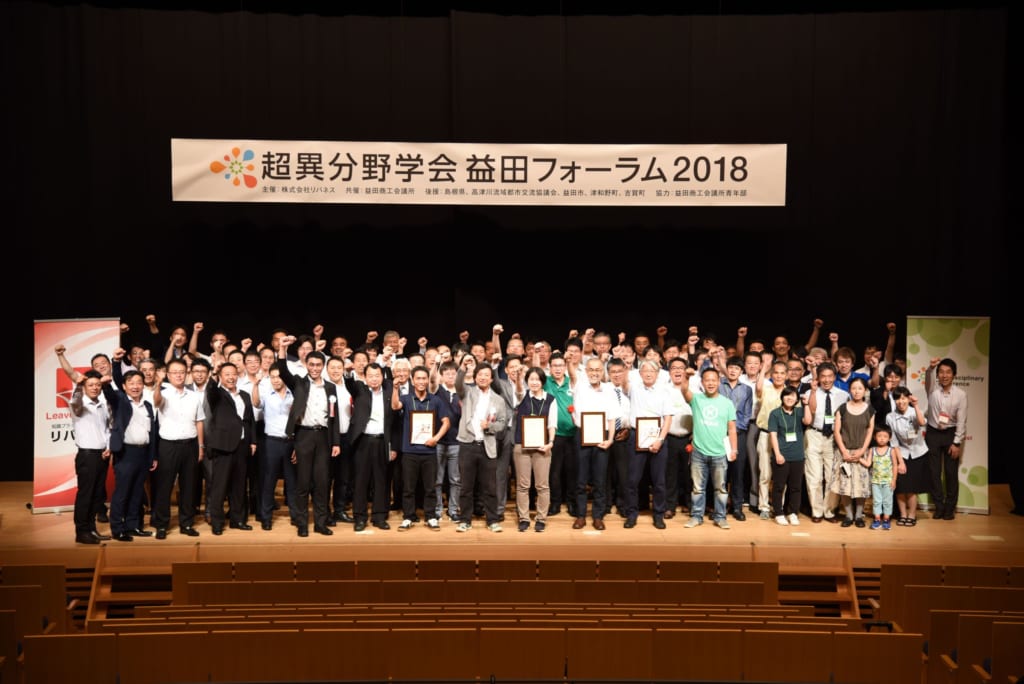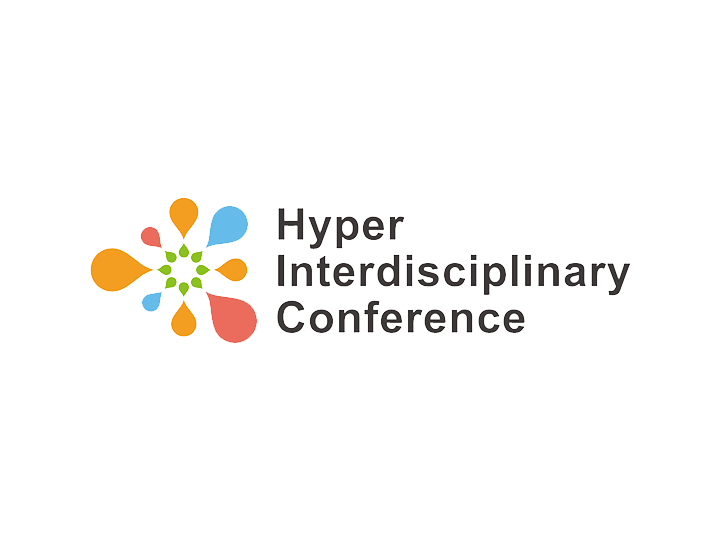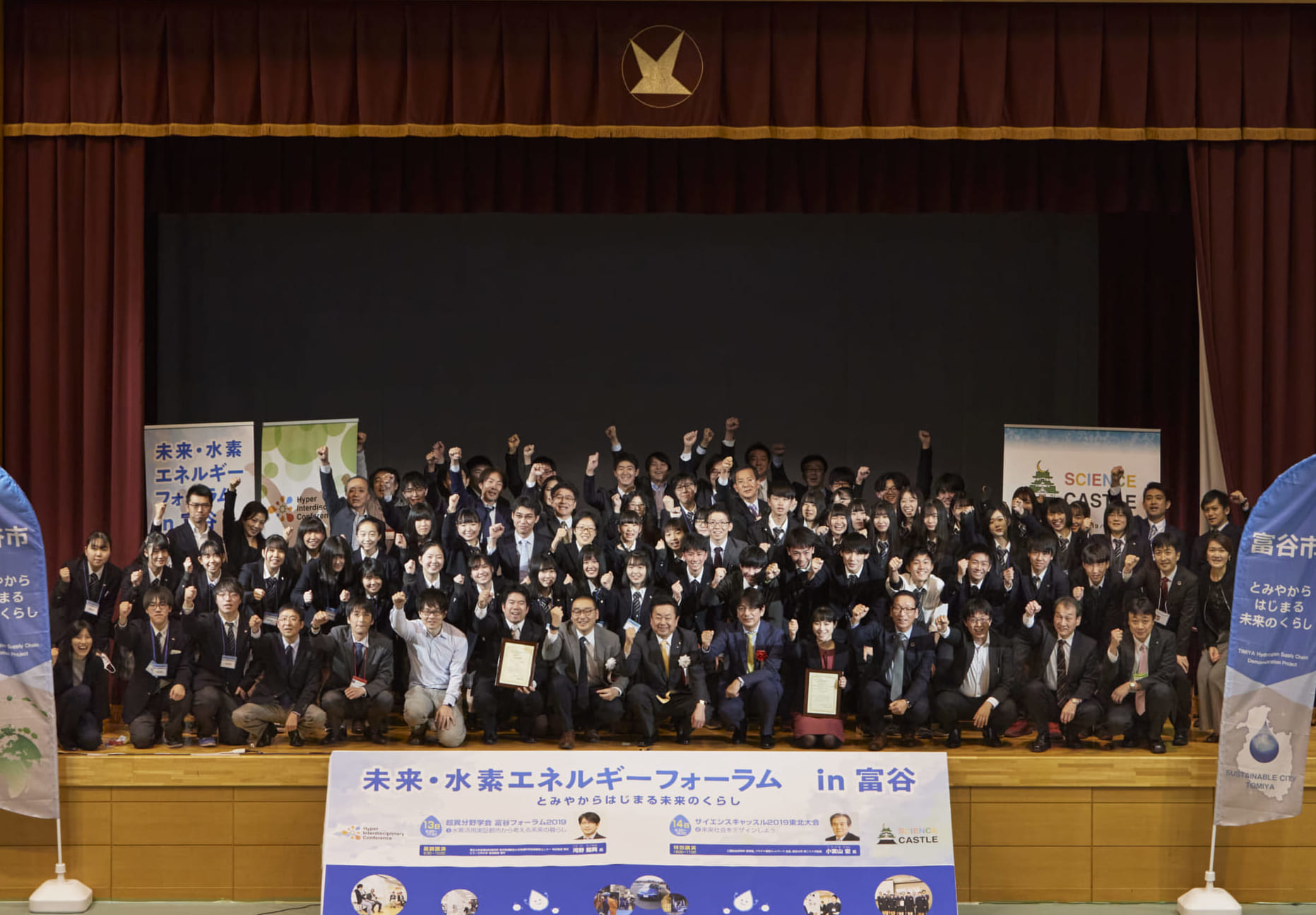- Notice
Over 230 attendees! 8/8 Super Interdisciplinary Society of Japan Masuda Forum 2018 was held.
2018.08.22
 (Head office: Shinjuku-ku, Tokyo; CEO: Yukihiro Maru) announced that on Wednesday, August 8, 2012, in Masuda City, Shimane Prefecture, it will host a regional conference of the Association of Hyperdifferent Fields, "Masuda Forumwas held for the first time.
(Head office: Shinjuku-ku, Tokyo; CEO: Yukihiro Maru) announced that on Wednesday, August 8, 2012, in Masuda City, Shimane Prefecture, it will host a regional conference of the Association of Hyperdifferent Fields, "Masuda Forumwas held for the first time.
The 230 participants, including researchers, venture companies, producers, junior high and high school students, and others from inside and outside Shimane Prefecture gathered for heated discussions on solutions to local problems such as population decline, lack of agricultural bearers, and devastation of mountains, forests, and farmland.
Masuda City is located 10 minutes by car from Hagi/Ishimi Airport, but is listed as one of the cities with the potential to disappear. The city's population is declining and aging rapidly, and issues such as a lack of agricultural bearers, which is a characteristic of the city, and the devastation of neglected mountains and forests are becoming apparent. Today, these issues are highlighted as serious challenges that symbolize not only the Masuda area but also other regions in Japan.
Therefore, the Masuda Forum was held with the aim of creating new R&D projects that contribute to solving the issues by bringing an influx of knowledge from different fields into the region and integrating it with local resources. The day of the forum was positioned as the kick-off of the project, and research promotion teams were formed according to four session themes, with "food and health" as the key focus.
Going forward, we will promote four research projects with the aim of creating an attractive community through cooperation between medicine, food, and agriculture.
Medical-food-farm collaboration and compact city model brought about by technological innovation
<4 Projects
● Visualizing health based on the Health Tech Mall
Realization of livestock production using abandoned forest land
Local Agriculture 2030
Preservation and distribution technologies that enable global expansion
Project 1: Visualizing Health with a Health Tech Mall as a Base
We will acquire biometric data on elderly people at supermarkets and shopping centers frequented by local residents and link this information to health promotion programs. By combining dietary and exercise advice with epigenome analysis, the effectiveness of the advice will be measured and verified. In addition, the creation of a place where people can gather and communicate with each other may itself contribute to health promotion. During the discussion, concrete figures were confirmed that a test on a scale of 1,000 people is necessary to obtain data that can be utilized, and the first step toward a demonstration test was taken.
Project 2: Realization of livestock farming using abandoned forest land
The project aims to create a new livestock industry through grazing, utilizing the increasing amount of abandoned farmland and abandoned forests. By controlling the nutritional status of the calves during their calving period, they will acquire a constitution that will allow them to grow fat and delicious on grass alone. In addition, a device attached to the cows will manage their location information, food intake, and activity zones to simplify grazing. In the future, a new beef production system will be constructed in Masuda City with a view to expanding the technology to Southeast Asia.
Project 3: Local Agriculture 2030
In response to the challenges facing regional agriculture, such as the aging of farmers, lack of successors, and the need to pass on farming techniques, the participants discussed how to realize a sustainable agriculture even in 2030 through the use of IT and advanced functionality in farm machinery and equipment. The discussion included specific examples, such as the automation of farm machinery to reduce the burden on farmers and the secret to success in the use of field monitoring systems, which increased the momentum for their introduction.
Project 4: Preservation and distribution technology to enable global expansion
Researchers and venture companies introduced technologies and ideas necessary for maintaining freshness and securing production volume, which are issues when exporting agricultural, forestry, and fishery products. They also touched on the need to secure production lots by relaying production areas, which is essential for building a value chain between Japanese production areas and overseas markets, and the need for key persons to organize products in production areas. The participating farmers were the first collaborators and shared the image of taking the project to fruition together with the speakers.
In the poster session, discussions were also held with local producers to create specific partnerships.
<Poster Session
Best Poster Award
Development of low potassium melon for dialysis patients and its practical application.
Dr. Toshiki Asao, Shimane University
Poster Special Award
"Simplifying and Upgrading Strawberry Cultivation."
Mr. Yuichi Kusano, Agri Mito Ltd.
I want to contribute to agriculture in the mountainous areas with cedar pollen rice."
Mr. Makoto Takano, National Agriculture and Food Research Organization
Visualization of Stress by Urinary Markers: Toward the Prevention of Mental Illness.
Ms. Ai Sugimoto, RESVO Corporation
A progress report on the new project that emerged from the Mashida Forum of the Society for Hyperdifferentiation will be presented at the main meeting of the Society for Hyperdifferentiation in Tokyo on March 8-9, 2018.
For the latest information, please visit the conference website at https://hic.lne.st/
<Contact us
E-MAIL [email protected] TEL 03-5227-4198
Nakajima, Matsubara, Research and Development Division, Liverness Co.



![The 8th Super-Disciplinary Conference] Exploring the Origins of Knowledge! Does Crossing Disciplinary Barriers Really Lead to Innovation? / March 9, 2019 16:20~17:50 @ Shinjuku](https://hic.lne.st/wp-content/uploads/sites/37/2019/02/chisikinogennryu.png)

![The 9th Conference of the Association of Hyperdifferent Fields] Can the Commonplace of Humans Become the Commonplace of Robots/AI? March 7, 2020, 16:00-@Ota-ku, Tokyo](https://hic.lne.st/wp-content/uploads/sites/37/2020/02/AI.jpg)